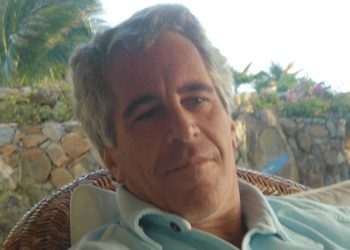- The Trump hush-money jury deliberated for 4.5 hours Wednesday before breaking for the day.
- First thing Thursday, they’ll get read-backs of key testimony by David Pecker and Michael Cohen.
- The read-back request suggests day one of deliberations ended deep in the election-conspiracy weeds.
Former President Donald Trump’s Manhattan jury deliberated for four-and-a-half hours on Wednesday — and their first note to the judge shows they were deep in the hush-money conspiracy weeds before breaking for the day.
First thing Thursday, they’ll be back in the courtroom, listening to their requested read-backs of four sections of testimony — about 30 minutes worth in total — that deal with the origins of Trump’s alleged 2016 election interference scheme.
The five-woman, seven-man jury asked to hear testimony by two key prosecution witnesses, former National Enquirer publisher David Pecker and former Trump attorney and “fixer” Michael Cohen.
They also asked that the judge re-read the one-hour jury charge they heard Wednesday morning. These instructions explained the felony falsifying business records charge that Trump faces 34 counts of, plus the underlying federal and state laws relating to that charge.
To convict, jurors must find that Trump falsified business records in order to hide an intent to commit an underlying state election conspiracy law that itself requires an intent to commit yet more “unlawful” behavior.
Trump pleaded not guilty and has denied any wrongdoing.
Wednesday’s lack of verdict meant there would be no immediate decision on this alleged Russian nesting doll of wrongdoing.
“We’ve received a note,” New York Supreme Court Justice Juan Merchan announced after the defense and prosecution filed back into the courtroom. The note was sent out just after 3 p.m., he said.
In it, jurors asked for four read-backs from the prosecution case.
‘Karen is a nice girl’
First, they asked to hear Pecker’s testimony “regarding the phone conversation with Donald Trump while David Pecker was at the investor meeting,” the jury note read.
They were asking, in other words, for the “Karen is a nice girl” testimony.
In this chunk of testimony from April 25, Pecker recounted being at an investor meeting in New Jersey in late June 2016.
Pecker testified that Trump called him during the meeting, eager to talk about Karen McDougal, the former Playboy Bunny who was threatening to go public with a story before the 2016 election — denied by Trump — of a nearly yearlong affair with the then-Apprentice star in 2006.
This read-back is significant in that Pecker’s testimony positions Trump at the center of what prosecutors call a “catch and kill” conspiracy to illegally influence the 2016 election by hiding salacious stories from voters.
“When I got on the phone, Mr. Trump said to me: ‘I spoke to Michael. Karen is a nice girl. Is it true that a Mexican group is looking to buy her story for $8 million?'” Pecker testified.
Pecker testified he told Trump he “absolutely” didn’t believe a Mexican group was planning to buy McDougal’s story for that much money.
“And then he said, ‘What do you think I should do?'” Pecker’s testimony continued. “I said, ‘I think you should buy the story and take it off the market.'”
Reuters/Mike Segar
‘The boss is going to be very angry’
The second chunk of the transcript to be read back Thursday morning concerns still more of Pecker’s testimony. It’s the former supermarket tabloid publisher’s take on a failed deal with Trump, who wanted to buy the life rights for McDougals’s alleged affair story from the National Enquirer for $125,000.
Trump was concerned that should anything happen to Pecker — “He could get hit by a truck” Trump was caught on tape joking — the National Enquirer’s secret records might not be secure, prosecutors have argued.
Pecker described speaking to his own attorney, deciding not to sell McDougal’s rights after all, and then breaking the news to Cohen just one month before the 2016 election.
Cohen began “screaming at me,” Pecker told jurors in the testimony section to be read back Thursday.
“And he said — excuse me, Michael Cohen said — ‘The boss is going to be very angry at you.'”
The read-back is significant in that it again shows Trump directly involved in the catch-and-kill conspiracy that prosecutors say underlies the indictment.
Trump, prosecutors allege, caused 34 Trump Organization records to be falsified to hide a series of reimbursement payments he made to Cohen throughout 2017, his first year in the White House.
Cohen had fronted a $130,000 hush-money payment to porn star Stormy Daniels, buying her silence just 11 days before the 2016 election, according to the prosecution’s case. Trump has denied any sexual encounter with Daniels.
Cohen’s reimbursement — including nine checks Trump personally signed — were falsely logged in Trump Org’s books as legal fees to disguise their true, election-altering origins, prosecutors allege.
Reuters/Jane Rosenberg
That secret Trump Tower meeting
The third and fourth read-backs on tap for jurors Thursday morning concern Cohen and Pecker’s testimony describing a secret August 2015 meeting at Trump Tower.
Trump had just announced his candidacy for president, the two witnesses testified and had called a meeting at his Manhattan skyscraper, where he kept offices for the Trump Organization and his budding campaign.
For around 20 minutes, in Trump’s 26th-floor office, they discussed with Trump how the National Enquirer could help get him elected, Cohen and Pecker testified.
It was at this meeting that the illegal campaign conspiracy underlying Trump’s indictment was hatched, according to the witnesses.
Under the alleged conspiracy, Pecker, Trump’s longtime friend, would alert Cohen when negative stories arose. Pecker testified he also agreed during the meeting to publish favorable stories about Trump and unfavorable stories about Trump’s opponents, including a story falsely claiming that Republican primary opponent Ted Cruz had five mistresses.
Cohen and Pecker’s testimony about this pivotal meeting cuts both ways.
On cross-examination, Pecker conceded that he had been using the National Enquirer to help Trump in similar ways for years, without any connection to campaign strategy — because these kind of stories simply sold well.
Jurors were told to return to court at 9:30 a.m. local time and to expect to deliberate until 4:30 p.m. — unless they ask to work late, in which case they could stay until 6 p.m. local time.










